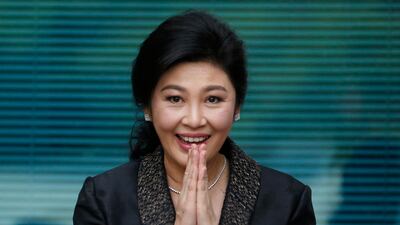Thailand's top court on Wednesday sentenced ousted premier Yingluck Shinawatra in absentia to five years in prison for criminal negligence, a verdict that almost certainly ends the political career of a popular leader who fled the country last month.
Yingluck's administration was toppled in a 2014 coup and she was later put on trial for failing to stop corruption and losses in her government's rice subsidy scheme, which the court said cost the country billions of dollars. She pleaded not guilty and accused the ruling junta of a political witch-hunt.
But the supreme court in Bangkok found her guilt of all charges and sentenced her to five years in prison.
"The court also unanimously agreed that the sentence will not be suspended," a judge said.
The verdict, which makes Yingluck's return to the kingdom increasingly unlikely, said the leader was aware of corrupt deals made by members of her administration but did nothing to stop them.
"She should have designated reasonable and effective regulations that could concretely prevent loss from the beginning of the programme," the verdict said, adding that the policy cost Thailand nearly $10 billion in losses.
After attending dozens of hearings in a trial that lasted more than a year, Yingluck failed to turn up for a ruling originally scheduled for August 25 -- a day of high drama that left the kingdom dumbfounded.The 50-year-old, who still has the right to appeal, has not appeared in public since her vanishing act. Her once active social media accounts have also gone silent.
But there are widespread reports that she fled to Dubai to join her billionaire brother Thaksin, a former prime minister who was ousted in a 2006 coup. Thaksin has kept a home in the city since he too fled Thailand in 2008 to avoid jail for a corruption conviction.
- Coups and court rulings -
The Shinawatra siblings lie at the centre of a political battle that has gnawed at Thailand for more than a decade.The clan first emerged on the political scene in 2001 when Thaksin took office and secured the loyalty of the rural poor with groundbreaking welfare schemes. Shinawatra-backed parties have dominated electoral politics ever since, inflaming Bangkok'selite, which is allied to the military.
Unable to beat the Shinawatras at the polls, their rivals have turned to court rulings and coups to repeatedly remove their governments from power. Repeated rounds of rival protests have ensued, often spilling into bloodshed.
Analysts say the latest coup, followed by Yingluck's trial, was part of the ruling junta's effort to expunge her clan from politics for good.
The guilty verdict may not erase the Shinawatras' influence altogether but it spells "the end of Yingluck's political career," said Thitinan Pongsudhirak, a politics expert at Chulalongkorn University.
It also sends a warning sign to would-be successors who might try and challenge the dominance of the military and its allies in Bangkok's traditional aristocracy.
"This is the first time that a Thai prime minister is sentenced to jail for a policy from an election campaign," said Mr Thitinan, calling it "a tough and tricky standard for future Thai prime ministers".
- Where is Yingluck? -
The leaders of Thailand's junta deny having any prior knowledge of Yingluck's plan to escape.But many inside the kingdom are unconvinced, given the junta's tight security net and round-the-clock surveillance of the former leader during the course of the trial.
Analysts say Yingluck most likely cut a deal with the military leaders, who would have been eager to see off a popular politician poised to become a martyr for the country's moribund democracy movement.
"By getting Yingluck out of Thailand, the military gets rid of a potential thorn in their side who could become a martyr if jailed, or a powerful politician again if she is not," said Paul Chambers, an expert on Thai politics.
On the eve of the verdict, junta chief Prayut Chan-O-Cha declared his "spies" had informed him of Yingluck's whereabouts, but said he would not reveal her location until after the judgement was delivered.
The generals have promised an eventual return to democracy but the date for elections keeps slipping, as they extend their clampdown on dissent.
Even if a poll is eventually held, it will be organised under a new charter drafted by the junta, that significantly curbs the power of elected politicians and enshrines the military's oversight of any future government for the next 20 years.

